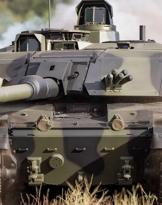Those calls, certainly too quickly and with propaganda, special Iraqi troops, abandoned their latest generation of US production equipment to the terrorists and fled, leaving hundreds of regular troop soldiers in the last bag of resistance still active in the city. The umpteenth proof of a government which certainly does not lack the money to buy every type of military equipment, but which is not able (without the help of the coalition) to win on the field against the Islamic State.
From the United States, the comment is extremely negative, almost derogatory. The American special departments (but in fact the whole soldier ethic is based on this), never abandon anyone in the field, even at the cost of their own lives (and the examples are not lacking). Which, on the other hand, does not seem to have been acknowledged by the much-publicized elite soldiers of the Loyalist army. Many soldiers would have remained inside the Anbar Operations Center, after a vast operation that began last Saturday to take back the city from fundamentalist control.
"Only God can save us," an officer who had been a prisoner in the Anbar operations center with a hundred soldiers said in the last radio message. Their fate is uncertain. The latest information coming from the front, speaks of a structure surrounded by thousands of militiamen, hit several times by suicide bombers and heavy artillery fire. A few hours ago, on the social media accounts considered close to the terrorists, posts appeared that announced the conquest of the operations center and that the efforts to repel the assault were successful.
The conquest of Ramadi had started last Thursday, but the counter-attack of the ISIS did not allow itself to wait, considering that forty-eight hours later, all the lost positions had been reconquered by the soldiers of the caliphate. The Loyalist army then left its positions last Saturday, abandoning dozens of US armored vehicles, artillery, heavy machine guns and other military equipment. The Iraqis have fled on foot.
The advertised (and shameful) elite unit "Golden Brigade", presented to the public as the best special unit of the Loyalist army, was the first to leave its positions. Barricaded last Friday in the area of the stadium of the city, it then abandoned its positions a few hours later, leaving the other units that relied on it at the mercy of the enemy. The umpteenth confirmation of the excessive ease with which the "special" and handsomely equipped troops of unstable governments such as Iraq, bear this reputation.
Millions of dollars are not enough to make simple men special who (in some cases) use those epithets only to perform atrocities against their own people and then flee from the enemy. The latest generation equipment is not alone in creating soldiers.
Ramadi's 90%, according to what the city mayor Dalaf al Kubaisi said yesterday evening, is in the hands of the Islamic State. The last pockets of resistance may already have fallen into the hands of the insurgents. A battle, that of Ramadi, which saw continuous supplies from the government including 40 Humvees sent Saturday night.
On paper, the numbers were clearly in favor of the government recognized by the international community. In the siege of Ramadi three regiments of Iraqi soldiers took part (in addition to "special units"), for what was to be a liberation. It turned out to be a massacre that will soon be documented, according to the well-known ISIS editing skills.
About 500 soldiers have fled to the main road connecting Ramadi to the capital Baghdad: about 60 miles of asphalt under the total controlled by the Islamic State.
The Iraqi prime minister, Haider al-Abadi, responding to the current crisis, went on state television yesterday evening to announce the deployment of Shiite militias supported by Iran. We will assemble an enormous force - al-Abadi said - we will purify the entire province of Anbar from terrorists.
The capture of Ramadi, a city whose population is estimated to be between 500 thousand and 900 thousand units, is by far the largest victory of the Islamic State, after the conquest of Mosul with 2 million inhabitants is the second largest city Iraq.
The victory of last night, comes after nine months of US bombing in Iraq and is in contrast with the all-triumphalist American declarations of recent days. Unlike Fallujah, the subject of two American offensives, Ramadi never fell completely into the hands of extremists.
The city has been besieged since January of last year, but the turning point happened on Thursday night with a series of attacks in the key points of the city that sanctioned the beginning of the offensive of the Islamic State. At least seven coalition air raids have been launched in the last forty-eight hours, but the bombing has had no effect on the outcome of the battle.
With the fall of Ramadi there are fears for the city of Baghdadi, which could be conquered in the next few hours. Baghdadi is not a big city, but it is of extreme strategic importance because it represents a vital sustenance line with the control of the Haditha dam, one of the largest infrastructures in the country, both for the production of electricity and water flow in crops.
The appeal of the Mayor of Baghdadi, issued this morning, is as tragic as it is clear: "We ask the Iraqi government to immediately send us soldiers, we are surrounded by the Daash. We need food and we ask the United States to send us ammunition and weapons".
Franco Iacch












